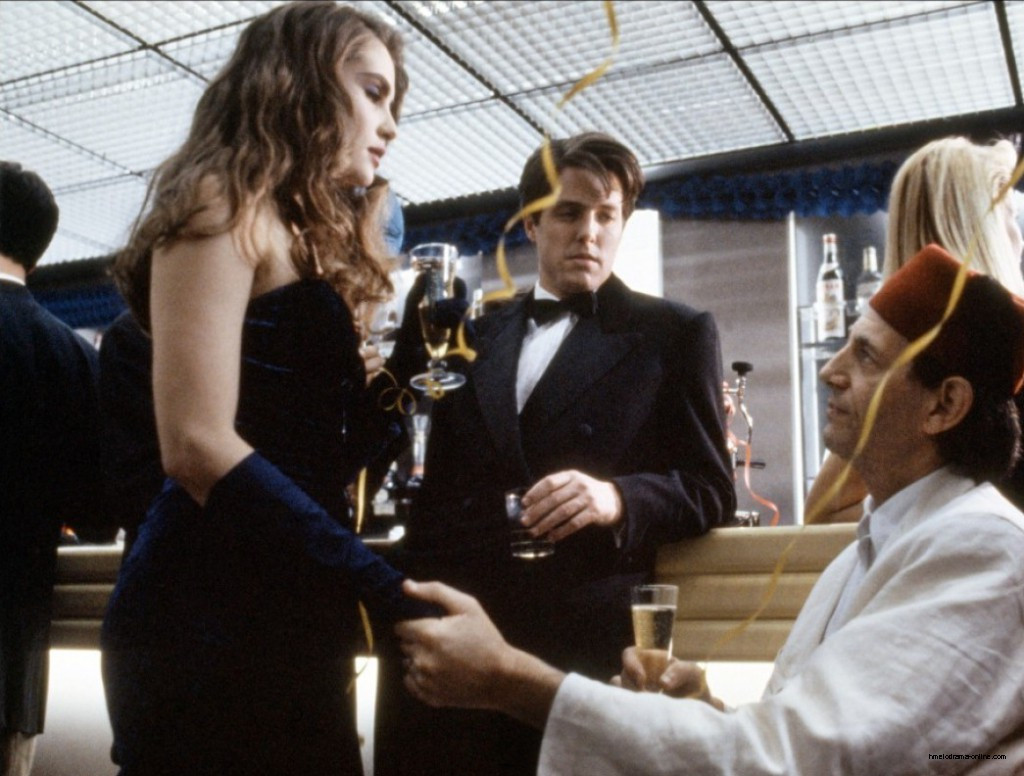
Bitter Moon (IMDB) is a 1992 erotic/romance film, directed by the notorious Roman Polanski, based on the novel Lunes de Fiel by Pascal Bruckner
Nigel goes on an ocean cruise with his wife, Fiona, where he becomes fascinated by a beautiful, mysterious woman named Mimi. Her husband, a paraplegic would-be writer named Oscar, demands that Nigel listen to his story of his obsessive love with Mimi before Nigel has an affair with her. Like another tale of twisted love, Nabokov’s Lolita, we shouldn’t take the narrator at face value. Mimi privately tells Nigel: “You musn’t believe all he says. He’s a sick man. He imagines things.”
In Oscar’s story, he is a self-consciously literary archetype, an independently wealthy young American living in Paris to become a writer. On a bus trip, he becomes smitten with Mimi, a young French woman.
Mimi is a cipher, with almost nothing more to her than being a beautiful French dancer, at least in Oscar’s telling. The early stages of their romance go from sweetly romantic to an adolescent’s idea of eroticism.
Oscar: (to Nigel) “I’m only going into such detail to show you how completely enslaved I was, body and soul, by this creature whose dangerous charms have made such an impression on you.”
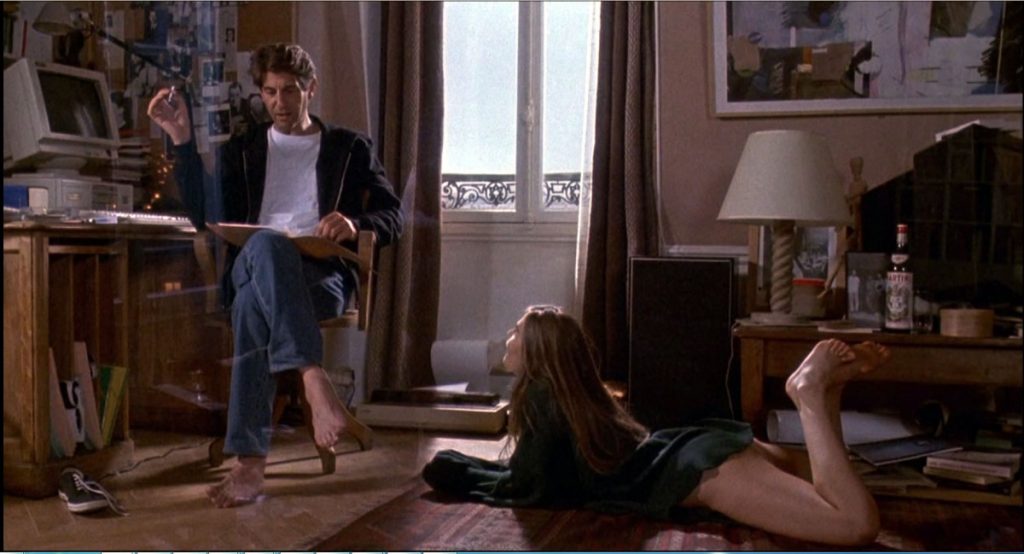
Despite this romantic bliss, Oscar says he feared he would lose interest in her. Instead, he tells Nigel about how they were on a ski vacation and he watched Mimi urinate on their chalet’s television set. Note that this scene is only described by Oscar. We don’t see the actors performing it.
Oscar: (to Nigel) “Time stood still for an instant. Then I rolled off the couch. I crawled over like a lunatic. I wormed my way between her legs and I turned over. And right away, I was engulfed with this warm, golden cascade. It spattered my cheeks, it filled my nostrils, it stung my eyes. And then something jolted my brain with multi-megavolt intensity. There was this blinding flash in the back of my eyeballs. I experienced the orgasm of a lifetime.”
Nigel: “For god’s sake, man.”
Oscar: “It was like a white-hot blade piercing me through and through. This was my Nile, my Ganges, my Jordan, my fountain of youth, my second baptism.”
Oscar sneers at his presumptions about Nigel and Fiona’s sexual life. Nigel calls this obscene.
Oscar: “Obscene? Have you ever felt real overpowering passion? Have you truly idolized a woman? Nothing can be obscene in such a love. Everything that occurs between you becomes a sacrament.”
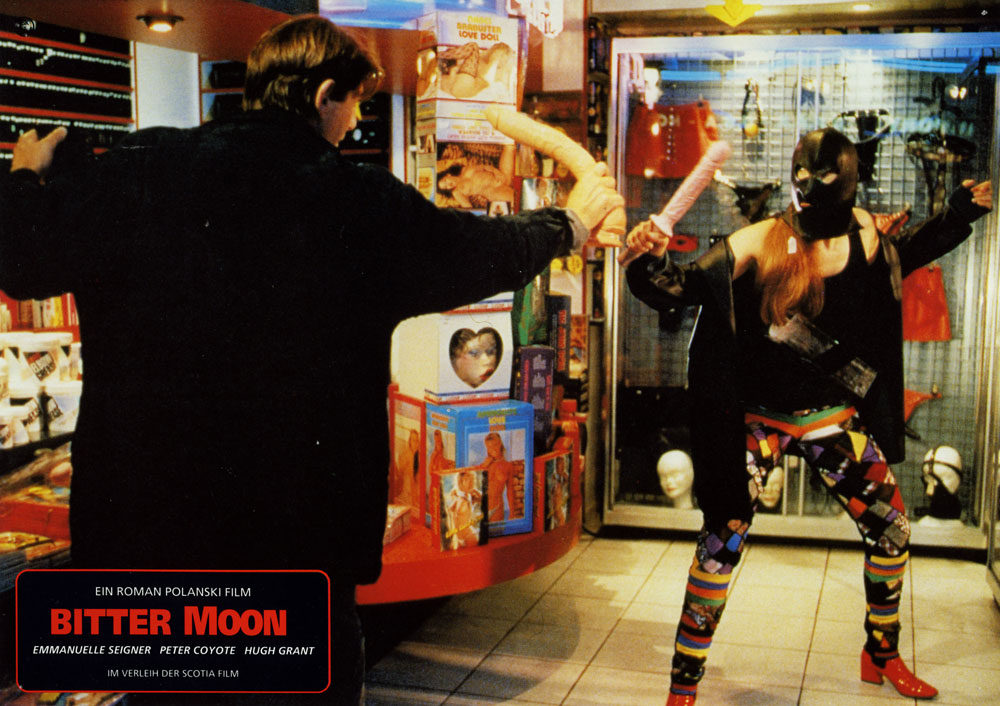
Oscar and Mimi go on a shopping spree at an adult store for sex toys; Mimi treats this as a lark.
Oscar: [narration] “I always had a suspicion it might be supremely pleasurable by a beautiful woman. But it was only now I realized what this could entail.”
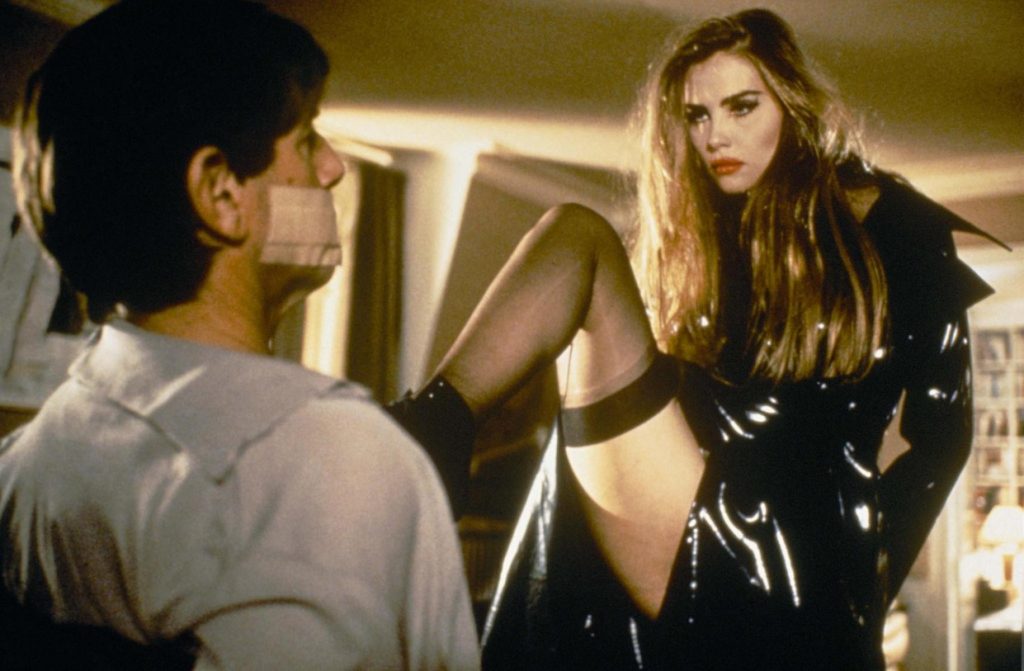
Next, we see Oscar handcuffed in a chair, with tape over his mouth. Mimi, dressed in a black PVC trench coat (perhaps a nod to Severine’s coat in Belle de Jour), appears before him and cuts off his clothes with a straight razor, before pushing him over and standing over him in her lingerie.
In the next scene, the friction is back in their relationship. Oscar gets irritable when Mimi asks him about the women in his fiction, and she retaliates by dancing with another man at a party. This is the beginning of the cuckold theme.
Oscar: [narration] “I’d always found infidelity to be the most titillating aspect of any relationship. That scene should have turned me on. So why didn’t it? Why did I feel so hurt?”
In another scene with Mimi as a dominatrix and Oscar wearing a pig mask, they both realize that neither of them are into it. This is the end of the masochistic phase of Oscar’s story, and the beginning of the sadistic phase.
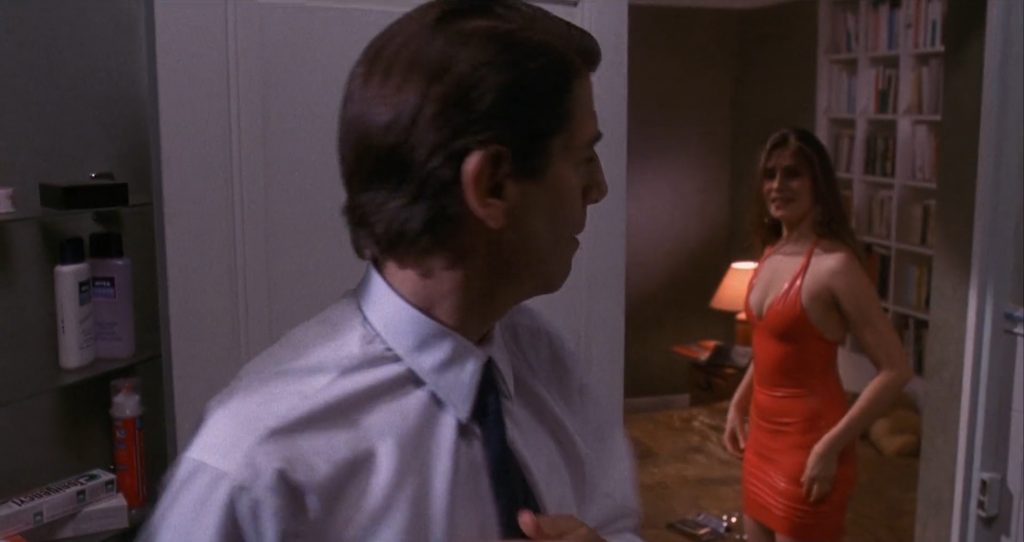
When Mimi squeezes herself into a skin-tight orange latex dress before going out with him, he passive-aggressively criticizes her. She goes out in a relatively modest dress. After the dinner, they fight. She packs her bags to go, and Oscar does nothing to stop her. She literally falls to her knees and begs him to let her stay.
A breakfast argument escalates into a physical fight, and he slaps her across the face three times. She falls to the floor, unconscious. When she comes to, she doesn’t want him to call a doctor, just hold him. Instead of going to a hospital, they take in the Paris nightlife. Oscar tries to break up with her.
Oscar: “I’m degrading myself by degrading you. We’re degrading each other, for god’s sake.”
Even though Oscar leaves her in the park, he comes home to find her sleeping on his doorstep. Still bearing bruises on her face, Mimi tearfully begs him to take her back, but Oscar coolly smokes a cigarette, unmoved.
These scenes are hard to watch, especially considering that director Roman Polanski was married to Emmanuelle Seigner when they were shooting this movie.
Oscar: (narration) “Everyone has a sadistic streak. And nothing brings it out better than the knowledge you’ve got someone at your mercy. If she really fancied living in a living hell, I’d make it so hot, even she would want out.”
This is the sadistic phase of Oscar’s story, constantly “negging” her into a neurotic mess, until she dyes her hair grey and wears nothing but frumpy dresses. She’s gone from girl next door to temptress to dominatrix to frumpy, neglected housewife. She stops dancing. He humiliates her in front of other women at a party. She tells him she is pregnant with his baby, which he rejects. She has “complications” and loses the baby. Oscar books a tropical vacation for two, then leaves her on the plane and fakes an illness to get off.
After two years of screwing women all around Paris, Oscar has a car accident, though with only minor injuries. As her recuperates in the hospital, Mimi returns, now back to herself. He still rejects her. She yanks him out of bed and somehow damages his spine, leaving him paralyzed below the waist.
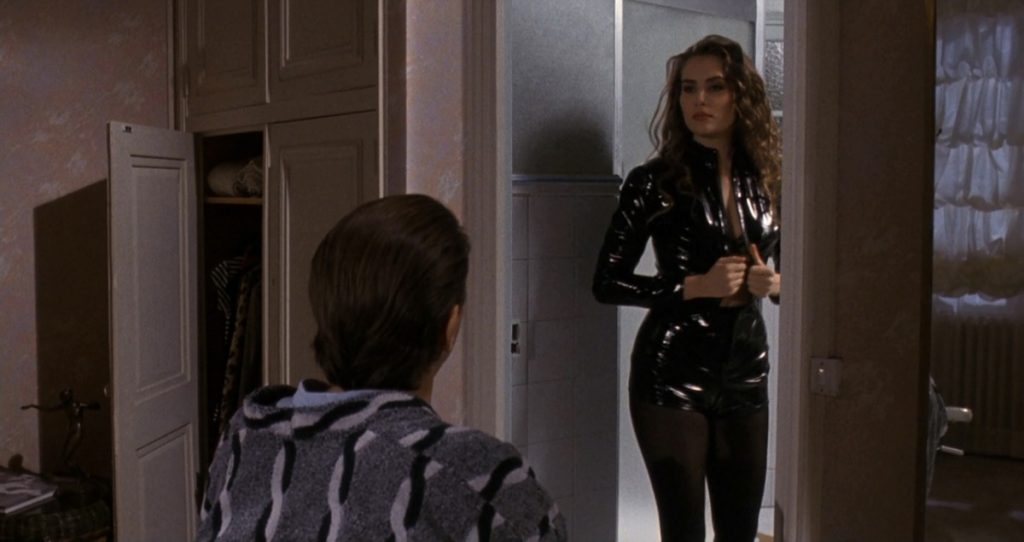
Mimi moves back in and reduces Oscar to a state of infantile dependence on her, almost literally, as when she leaves him in his chair overnight while she goes out and he has to urinate on the floor.
Oscar: (narration) “It crossed my mind she might still love me, in spite of everything. After all, it’s no fun hurting someone who means nothing to you.”
Mimi puts him through her own form of psychological torment, mostly preying on his helplessness and jealousy. She changes into sexy lingerie and a black PVC playsuit in front of him, so she can go out. (PVC and other fetish materials signify Mimi at her most powerful and independent.)
Oscar: (to Mimi) “Look, I know I deserve all I get. I treated you like a monster. I am a monster.”
Mimi gives him a birthday present: a loaded handgun.
Oscar: “I despise myself, I hate myself. I hate myself worse than you could ever hate me.”
Mimi: “Don’t kid yourself, Oscar. No one could hate you more than I do.”
In another scene, Mimi invites over a black male dancer and she shamelessly flirts with him, showing off his body, telling Oscar he is straight. Mimi and Basil dance together sensually, then go into the bedroom (now Mimi’s bedroom, while Oscar sleeps in the apartment’s main room), and we-as-Oscar hear the sounds of sex.
These scenes are shot from Oscar’s point of view, as performances for him, not an expression of Mimi’s independent sexuality. It’s very “male gaze”.
Oscar: (narration) “We both knew we’d never rediscover the same extremes of passion and cruelty with another living soul.”
Oscar and Mimi get married, which probably means she’ll get his money when he dies; another aspect of his emasculation.
In the present, Oscar winds up his story for Nigel. He says he lives in constant dread of losing Mimi, but he “supervises” her affairs with other men. Is this just a contrived justification for his cuckold fantasy, or had he made himself a cuckold to eroticize his situation?
Nigel approaches Mimi to have sex, but she refuses him. Instead, Nigel and Oscar are stuck on the sidelines of the ship’s dance floor as Mimi and Fiona sensually dance with each other, a la Bertolucci’s Il Conformista. Oscar welcomes Nigel to the brotherhood of cuckolds, men who could not satisfy and control their women. Nigel threatens to hit Oscar.
Oscar: “Go ahead if it’ll help. I deserve your hatred. I’m abominable. I’m pathetic.”
Later, Nigel finds Oscar has apparently watched Mimi and Fiona have sex in Mimi’s cabin,
In front of Nigel and Fiona, Oscar shoots Mimi in her sleep.
Oscar: (tearful) “We were just too greedy, baby. That was all.”
Oscar shoots himself in the head.

How much of the story Oscar tells Nigel is true is hard to tell. Trying to make sense of Oscar’s narrative in terms of realism is probably pointless. It should be interpreted as sexual fantasy. Mimi is less like a person and more like a mannequin dressed up as various archetypes from the heterosexual male erotic imagination: virgin schoolgirl, dancing nymph, slutty bimbo, dominatrix, cuckoldress, black widow, etc. It’s possible, likely even, that the Mimi of Oscar’s story is a composite of various women he’s been involved with, plus another layer of fantasy. The vanilla, tritely romantic scenes with Mimi are just as much his fantasies as her maiming him.
Then there’s the question of the why of Oscar’s story. Is Oscar ultimately a masochist and his sadistic phase was a post hoc justification for Mimi’s mistreatment and his own self-loathing? Or is it vice-versa, with Mimi’s mistreatment of him to justify his cruelty to her? Or did he indulge so deeply in his sadism that his guilt forced him into masochism? There isn’t a linear progression of cause and effect. It’s more like Oscar oscillates between the two poles of sadism and masochism, both directed at his feminine archetype. Either way, he can’t give her up.
Setting aside Polanski’s personal life, Bitter Moon is a rather misogynistic work, and it has few champions, especially with its running time of over two hours. Seigner starred in a number of films directed by Polanski, and they were married in 1989. 21 years later after Bitter Moon, Seigner played the lead, Vanda, in Polanski’s French film adaptation of David Ives’ play La Vénus à la fourrure (2013), aka Venus in Fur. Like Mimi, Vanda is a projection of heterosexual male desires and anxieties, not a realistic character. The situation also echoes Venus in Furs, in that it’s a story told by one man to another, warning him of the dangers of women. That novel, in turn, was written by a man who was rather terrible to the women in his life, all the while obsessing over the thought of women hurting and controlling him. Perhaps the driving impulse of Bitter Moon isn’t sadism or masochism, but cuckoldry, in which the man observes his woman and other men playing out his sexual script, with his control over every detail hidden by the pretense of his helplessness; the fantasy of blameless omnipotence.




[…] in which Severin, after his experience with Wanda, ruthlessly dominates women. (It also echoes Bitter Moon in which the male protagonist oscillates between sadism and masochism towards women, one requiring […]